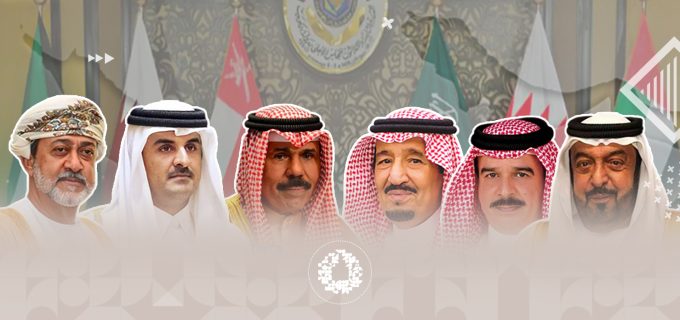Dialogue resumed about nearing a Gulf reconciliation after Kuwaiti Foreign Minister, Ahmed Nasser al-Muhammad al-Sabah, announced on Friday 4 December that his country’s efforts, in collaboration with Donald Trump’s Administration, culminated in the proximity of a Gulf reconciliation, as “fruitful discussions took place”. The announcement was met with congratulatory responses, regionally and internationally, for the mediation efforts aimed to resolve a crisis that has affected many of the region’s files. Meanwhile, the responses of the countries concerned with the reconciliation were conservatively welcomed. Despite the visit of senior adviser to the US President, Jared Kushner, to Doha, the visit of the Kuwaiti Foreign Minister to Egypt, and several days passing by, no serious indications emerged, with the exception of some statements of an improvement in the relations between the Gulf countries at a bilateral or collective level. There was very little media and political preparation for a reconciliation.
This assessment of the situation deals with the developments of the Gulf reconciliation, the motives for reconciliation, and the dealings of the countries concerned with it. It also seeks to discuss the future of Gulf reconciliation and its implications for the region.
Latest developments in the Gulf reconciliation
After a state of stagnation following the illness and death of the former Emir of Kuwait, Sabah Al-Ahmad Al-Sabah, who led the mediation over the past years, the Kuwaiti Minister of Foreign Affairs, Ahmed Nasser Al-Muhammad Al-Sabah, announced Friday, December 4, that: “fruitful discussions took place recently and all parties affirmed their keenness on Gulf and Arab solidarity and stability to reach a final agreement that will achieve lasting solidarity between their countries and the good of their people.”
Al-Sabah also thanked Jared Kushner, senior advisor to the US President, “for the valuable efforts he has made recently in this regard”.
Qatar was quick to comment, as Foreign Minister Mohammed bin Abdul Rahman Al-Thani said: “The statement of the State of Kuwait is an important step towards solving the Gulf crisis. We thank Kuwait for its mediation since the beginning of the crisis, and we also appreciate the US efforts made in this regard. The interest and security of the people of the Gulf and the region has been, and will remain, our top priority.”
The Saudi position was that of welcoming the efforts of Kuwait, with a conservative aspiration for the success of the reconciliation. The Saudi response came in the form of a tweet by the Minister of Foreign Affairs, Faisal bin Farhan: “We consider with great appreciation the efforts made by Kuwait to bridge the gap in viewpoints regarding the Gulf crisis, and we thank the American efforts in this regard, and we look forward to being crowned with success for the benefit and good of the region.”
The Emirati position was that of ambiguity. It deliberately avoided interacting with the circulating news about the nearing of a Gulf reconciliation. After Dr Abdul Khaleq Abdullah, who is as an advisor to Abu Dhabi’s Crown Prince Mohammed bin Zayed, affirmed that the Gulf reconciliation cannot take place without the approval of his government, he faced pressure, after which he deleted his tweet and indicated that there is correspondence underway to solve the Gulf crisis.
As for the Egyptian regime, its Foreign Minister Sameh Shoukry announced on December 9, 2020, that: “understandings and contacts were made regarding reconciliation with Qatar,” noting that “there are proposals for a new phase that avoids the negative effects of Qatari policies.”
Bahrain’s position came in line with the Emirati position with the tense nature of the semi-permanent bilateral relations with Qatar. However, this position can be influenced by the Saudi position if Riyadh’s desire for reconciliation was met. Amid the optimistic mood in nearing the end of the Gulf crisis, the manifestations of the bilateral disputes between Qatar and Bahrain repeatedly appeared in the media and at the maritime borders between the two countries. On December 13, the Qatari Al-Sharq newspaper reported that the coast and border security patrols stopped a Bahraini cruiser in the Fasht Al-Dibel area within the borders of Qatari waters at 1.3 nautical miles. Three sailors on board the cruiser were fishing using traps; one Bahraini national and two Asians. They were seized and referred to the Public Prosecution to complete the legal procedures against them. About two weeks before the incident, on November 25, two Bahraini boats entered Qatari waters, and Manama justified the incident saying that the two boats lost contact. Coordination was made between the concerned authorities for their return.
Motives for Gulf reconciliation
Motives for Gulf interests range from the limited desires of the countries concerned, to the desire and interests of external actors, specifically Kuwait and the US.
Donald Trump’s desire to score an achievement at the end of his reign for the crisis that began at the beginning of his term, and to address the suspicion of collusion with countries opposed to Qatar, was evident recently when Trump sent his son-in-law and advisor Jared Kushner to the Gulf to settle the crisis. The motives were also interpreted as facing the security challenges of the Gulf region and the possibility of taking measures against Iran, and perhaps even attempting to curb the influence of regional and international countries (Turkey, China and Russia). Other expected motives include arranging the Gulf leaderships and priming the atmosphere for the transfer of power in some of its countries.
Scenarios of Gulf reconciliation and its implications
Repercussions of the Gulf reconciliation vary according to the extent to which it can be actualised in relation to state reviews of the interests, approaches and principles of the intra-regional relations of the countries concerned, as well as their relations with their regional and international allies.
The first scenario: failure of the Gulf reconciliation
This scenario assumes the continuation of the Gulf crisis between Qatar and each of Saudi Arabia, the UAE, Bahrain, and Egypt. This scenario can actualise given the complexities of the crisis and the contradictory state interests, and that the efforts that drive the reconciliation are external rather than an expression of the will of the countries, stemming from real considerations and understandings.
This scenario is reinforced by the absence of practical indications for reconciliation. The latter would indicate that the phase of disagreements was over and that the process of reconciliation had begun. The collapse of negotiations or their freezing is a possibility consistent with the behaviour of the Gulf states during the years of the crisis and their lack of positive response to efforts led by the late Emir of Kuwait, Sheikh Sabah Al-Ahmad Al-Jaber Al-Sabah, in his mediation to achieve reconciliation.
Despite efforts led by Trump’s administration, countries, especially those that are boycotting Qatar, may prefer to postpone any reconciliation until the administration of President-elect Joe Biden assumes power early next year, in order to use the reconciliation to strengthen their relationship with the US.
This scenario is weakened by the difficulty of continuing the already-prolonged crisis indefinitely, in light of the threats to the region, the normalisation of relations with Israel by some countries (the UAE and Bahrain), and societal questions about the paradoxes of relations and the priorities of normalisation with Qatar.
- Implications of a failed reconciliation scenario
The failure of Gulf reconciliation means the continued tension in relations between the countries of the crisis, the management of their conflicts by proxy, the strengthening of their individual relations with regional and international countries, as well as the employment of media platforms and lobbies in key countries and international organisations, and the tightening of measures against local figures who do not support the continuation of the Gulf crisis.
The second scenario: comprehensive and lasting reconciliation
This scenario would expect the Gulf states to reach a comprehensive solution to the crisis and achieve a lasting reconciliation that prevents its recurrence. This would be a conclusion of a bitter experience that the states and its people have gone through, and the states’ need for peace and improve their image, and provide the efforts and money that states have lost during the crisis.
This scenario, which is less likely at this stage, supports geographic and societal commonalities, as well as the common threats faced by the Gulf states, the necessities of coexistence in the region, in addition to Qatar’s need for the restrictions imposed on it to be lifted. Furthermore, there’s Trump’s attempts to persuade Doha to normalise with Israel in exchange for reconciliation, and Riyadh’s desire to neutralise the media apparatus leading up to the transition of power, Riyadh’s preparation to have a less affable relationship with Washington, and narrowing any opportunities for Iran.
This scenario is weakened by the complexity of the problems between the countries of the Gulf crisis, in addition to Egypt, and the extent of their foreign relations, and the lack of trust between them. The latter was reinforced by the severe measures taken during the crisis, the attempt to deport figures who challenged the right to rule, the threat to invade Qatar, and Qatar’s convictions of the need to fortify its national security with regional alliances.
- Implications of reconciliation scenario if realised
The ending of media campaigns, the return of coordination in foreign policy towards regional files and employing bilateral relations to enhance common national security, including the war in Yemen.
On a domestic level, the Gulf reconciliation may be reflected in the release of figures arrested because of their political and reform orientations or positions, with the aim of strengthening the regimes’ relationship with their societies, or it may exploit that reconciliation to tighten measures against those figures and others who do not show enthusiasm for government policies.
The third scenario: settling manifestation of the crisis and remaining apprehensive
This scenario expects that the Gulf reconciliation will be limited to the normalisation of relations at an official level, the restoration of diplomatic relations, as well as taking necessary measures. These measures include: opening airspace to Qatari aviation and border crossings, while countries continue to retain some of their policies and alliances as a means of pressure; and the continued state of anticipation of positive interactions by some businessmen and public figures with the reconciliation, after witnessing the severity of measures taken previously.
This scenario reinforces the overlap of motives between the US administration’s pressures and the motivation behind the will of individual reconciliation/crisis countries in achieving comprehensive and lasting reconciliation. Moreover, the scenario reinforces the situation of bilateral competition between the Gulf states involved in the reconciliation/crisis, and the divergence of interests and regional alliances, both at an official level and locally.
This scenario is considered the most appropriate if reconciliation is achieved, so that the leaders regain confidence in their relations and prove their ability to deal with the intersection of interests and concerns that appear from time to time.
- Implications of scenario if realised
The scenario, if realised, consists of two stages: The first stage may move the reconciliation to an advanced stage (the comprehensive and permanent reconciliation scenario), and in case it fails, the crisis will return, and it may be greater than the previous ones (the failed reconciliation scenario). Hence, the implications of the scenario are a mixture of initiatives to demonstrate goodwill while preserving the tools of pressure and exercising them when needed and fortifying national security at an individual level (Qatar).
As for the local level of the Gulf states, every country acts with absolute sovereignty and authority, its goal being to preserve its national order and security. If it has a desire to improve relations with persons of opinion and influence, it does so without consideration of its neighbours, unless it is avoiding or exploiting Western pressure.




